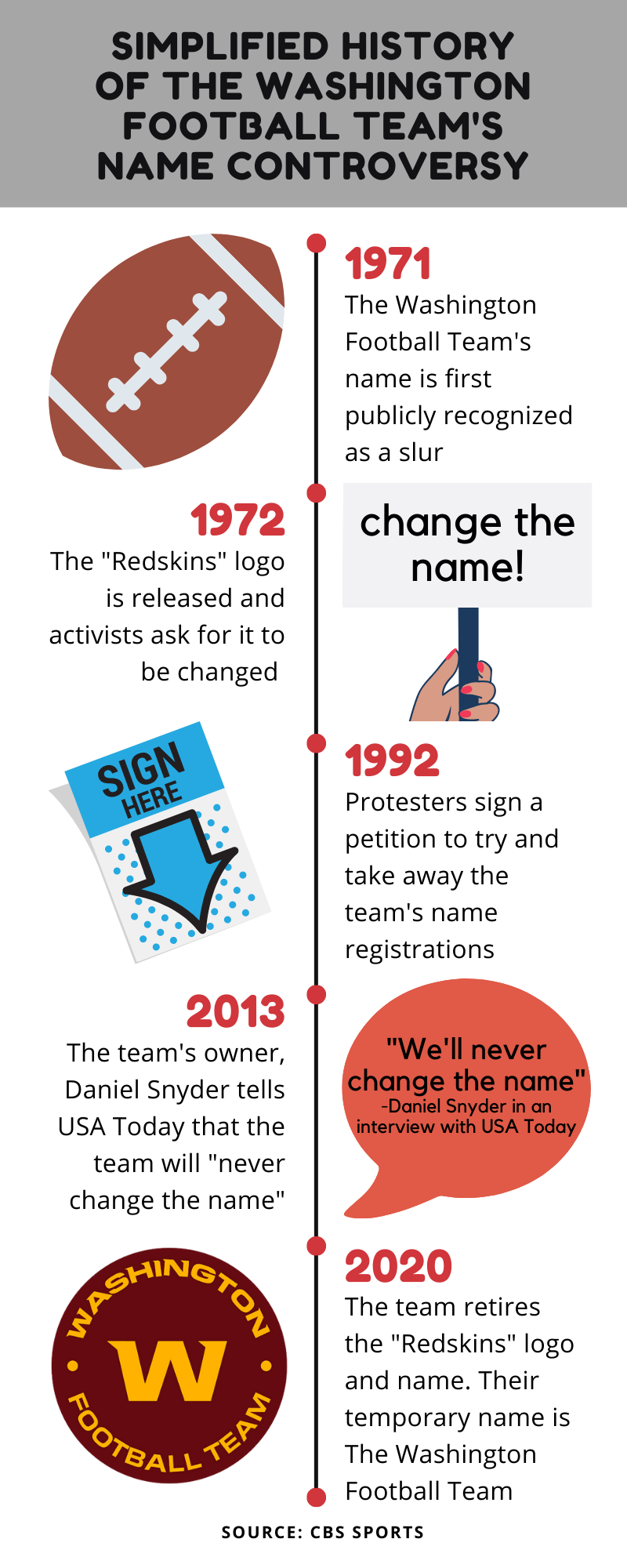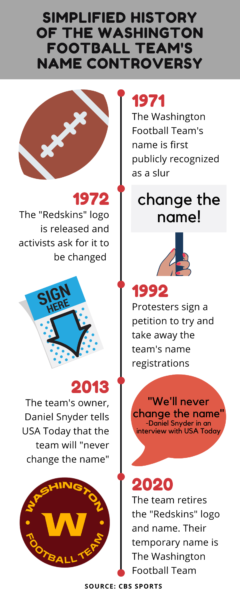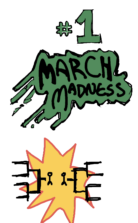

The names and mascots of sports teams should be a symbol of honor and pride, yet sometimes these names carry controversial meanings that people are unaware of. What happens when such names or mascots are associated with derogatory slurs?
Increasing awareness towards systemic racism, such as with the Black Lives Matter movement, has given rise to a wave of protests against racial inequality. Media influence has drawn public attention to the issue of discrimination against minorities, leading the public to revisit the racist connotations associated with the names of some well known sports teams in the U.S. One of the teams involved is the Washington Football Team, formerly known as the Washington Redskins.
A total of 15 Native American advocacy groups signed a letter to the NFL Commissioner Roger Goodell demanding the immediate change of the name, Washington Redskins, due to its insensitivity to the history behind the name. “Redskin” was first used by European colonizers arriving to North America more than 200 years ago as a racial identifier, but today referring to a certain racial group by skin color is largely considered racial discrimination and offensive.
The word “redskin” was frequently used as a derogatory slur to refer to Native Americans, who were portrayed as savages and uncivilized people in popular American Hollywood cowboy movies. Some also believe the name also carries connotation to the mass killings of Native Americans that occurred in American history. The team’s original fight song, “Hail to the Redskins,” originally referred to scalping, the practice of killing and removing the scalps of enemies to sell or to use as trophies. The stanza seen as most offensive was removed in the 1960s after pressure from Native American groups.
“Rather than honoring Native peoples, these caricatures and stereotypes are harmful, [and] perpetuate negative stereotypes of America’s first peoples,” said the National Congress of American Indians on their website.
For decades, multiple Native American groups have been protesting the 88-year-old football team’s mascot: a picture of a Native American side profile. Since July of 2020, the Washington Redskins have been renamed the Washington Football Team and will remain so until they pick a new name and mascot for the season.
The Navajo Nation welcomes the change.
“For generations, this team name and logo [have] misrepresented the true history and events that define the term ‘redskins,’” said Nez, the current president of the Navajo Nation, in a statement released on Twitter.
But not all Native Americans agree that changing the Washington Football Team’s name was necessary. According to a poll conducted by the Washington Post in 2016, nine out of 10 Native Americans were not offended by the team name. However, a poll conducted by the University of California, Berkeley in 2020 reported that 49% of Native Americans found the word “redskin” offensive. The surveys highlight the difference of opinions among Native Americans and how they are changing over time.
“Rather than honoring Native peoples, these caricatures and stereotypes are harmful, [and] perpetuate negative stereotypes of America’s first peoples”
Similarly, the Kansas City Chiefs are reexamining their team name in light of the Washington Football Team’s name change. The team was originally named after former Mayor Harold Roe Bartle, a non-Native American man who according to a legend from his Boy Scout troop, the Mic-O-Says, was nicknamed “Chief Lone Bear” by an Arapaho Indian chief. Bartle founded the Mic-O-Says, which painted their faces and wore regalia. Despite its Native American references, the team does not plan to change their name. However, there might be other changes to their traditions and fans’ game outfits.
One of the Kansas City Chiefs’ most famous traditions is the “tomahawk chop,” a chant and arm gesture used when celebrating a play in the game or as a pregame tradition. As a pregame tradition, Chiefs Cheerleaders, celebrities and former players beat the drum while the fans in the stadium hum a tune and make the forwards and backwards hand gesture. There is currently debate over whether the “tomahawk chop” is offensive and should be removed. For some, the chant mocks and exaggerates negative Native American stereotypes.
Fans may also no longer be able to dress as Native Americans because it is often seen as disrespectful and considered cultural appropriation. In a recent statement released by the Kansas City Chiefs, they banned fans from wearing headdresses and any Native American styled face paint that were deemed derogatory.
While these bans might be disappointing for some fans, there are still plenty of opportunities to demonstrate devotion to their favorite teams in inoffensive ways.



